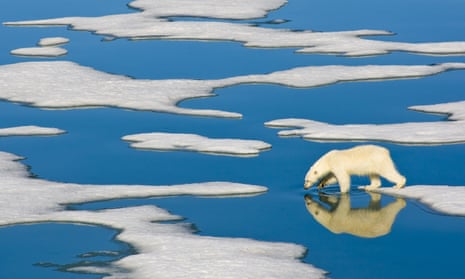The north pole could be hotter than Chicago, Vienna or Istanbul on Wednesday due to the low pressure system that has brought tornados to Dallas and high winds and heavy rainfall to the UK.
The Arctic could reach temperatures about 35C (63F) warmer than average for this time of year, meteorologists have warned.
Computer model projections earlier this week suggested that the air temperature at the pole, which is currently shrouded in 24-hour darkness, could reach 5C, rather than the usual -30 to -35C, according to Mashable. This would make it milder than much of Canada and the US.
Temperature fluctuations are fairly common in the Arctic, where shifts in sea ice cover can significantly affect local air temperatures, but such a strong variation is extreme.
“That’s absolutely terrifying and incredibly rare,” meteorologist Eric Holthaus told Slate.
“By any yardstick, these are extremely warm and likely record readings for the north pole,” noted climate blogger Robert Scribbler. The strange weather coincides with an unusually warm winter in Europe and the eastern US and torrential flooding in parts of south America.
The warm weather could affect the buildup of Arctic sea ice during the winter. Ice cover has already been vastly reduced by global warming.
The conditions have been caused by one of the biggest storms ever to hit the northern Atlantic, reaching speeds of up to 230mph. Storm Frank lashed the north of England, Scotland and Northern Ireland with downpours and gale force winds on Wednesday.
Temperatures have reached or exceeded freezing point at the north pole during December on only three occasions since 1948, according to meteorologist Bob Henson of WeatherUnderground.
- This article and headline were amended on 30 December to correct temperatures and conversions

Comments (…)
Sign in or create your Guardian account to join the discussion